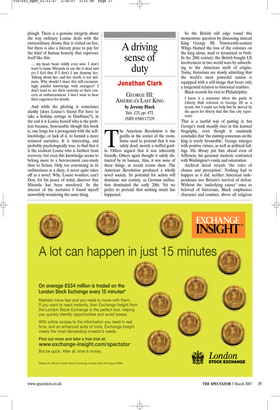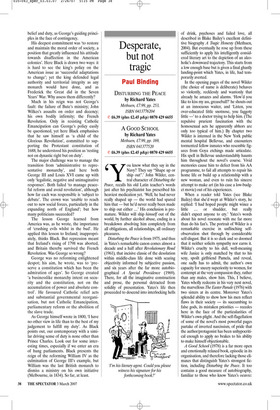A driving sense of duty
Jonathan Clark
GEORGE III: AMERICA’S LAST KING by Jeremy Black Yale, £25, pp. 475, ISBN 0300117329 The American Revolution is the gorilla in the corner of the room. Some used to pretend that it was safely dead, merely a stuffed gorilla. Others argued that it was inherently friendly. Others again thought it safely distracted by its banana. Alas, it was none of these things, as recent events show. The American Revolution produced a wholly novel society. Its potential for action will dominate our century, as German unification dominated the early 20th. Yet we prefer to pretend that nothing much has happened. So the British still edge round this momentous question by discussing instead King George III. Nineteenth-century Whigs blamed the loss of the colonies on the king alone, mad or tyrannical or both. In the 20th century, the British bought US involvement in two world wars by subscribing to the American myth of origins. Today, historians are slowly admitting that the world’s most powerful nation is equipped with a self-image that bears only a tangential relation to historical realities.
Black records his visit to Philadelphia:
I knew it a nonsense when the guide in Liberty Hall referred to George III as a tyrant, but I could not help but be moved by the quest for liberty that this fine city represents.
That is a tactful way of putting it; but George’s stock steadily rises in this learned biography, even though it cautiously concludes that ‘the existing consensus on the king is overly favourable’. George emerges with positive virtues, as well as political failings. His library put him ahead even of Jefferson; his personal modesty contrasted with Washington’s vanity and ostentation.
Archival detail reveals ‘the roles of chance and perception’. Nothing had to happen as it did, neither American independence nor Britain’s survival of defeat. Without the ‘underlying causes’ once so beloved of historians, Black emphasises character and conduct, above all religious belief and duty, as George’s guiding principles in the face of contingency.
His deepest commitment was ‘to restore and maintain the moral order of society, a position that greatly influenced his attitude towards disaffection in the American colonies’. Here Black is drawn two ways: it is hard to see the king’s policy on the American issue as ‘successful adaptations to change’; yet the king defended legal authority and territorial integrity as any monarch would have done, and as Frederick the Great did in the Seven Years’ War. Why assess them differently?
Much in his reign was not George’s fault: the failure of Bute’s ministry; John Wilkes’s assaults on order and decency; his own bodily infirmity; the French Revolution. Only in resisting Catholic Emancipation can George’s policy easily be questioned, yet here Black emphasises that he saw himself as ‘a child of the Glorious Revolution’, committed to supporting the Protestant constitution of 1688; he understood his position as ‘resting not on dynastic right but on duty’.
The major challenge was to manage the transition from ‘administrative to representative monarchy’, and here both George III and Louis XVI came up with only ‘legalistic, negative and unimaginative responses’. Both failed ‘to manage peaceful reform and avoid revolution’, although how far each was responsible is ‘subject to debate’. The crown was ‘unable to reach out to new social forces, particularly in the expanding north of England’; but how many politicians succeeded?
The lesson George learned from America was, as he wrote, the importance of ‘crushing evils whilst in the bud’. He applied this lesson to Ireland; inappropriately, thinks Black. But repression meant that Ireland’s rising of 1798 was aborted, and Britain thereby survived the French Revolution. Was George so wrong?
George was no reforming enlightened despot; his aim, he wrote, was to ‘preserve a constitution which has been the admiration of ages’. So George created ‘a businesslike monarchy intent on security and the constitution, not on the accumulation of power and absolute control’. He favoured Catholic relief acts and substantial governmental reorganisation, but not Catholic Emancipation, parliamentary reform or the abolition of the slave trade.
As George himself wrote in 1800, ‘I have no other view in life than to the best of my judgement to fulfill my duty’. As Black points out, our contemporary with a similar driving sense of duty is none other than Prince Charles. Look out for some interesting times, especially if we enter an era of hung parliaments. Black presents the reign of the reforming William IV as the culmination of George III’s example, but William was the last British monarch to dismiss a ministry on his own initiative (Melbourne, in 1834). So far, at least.











































































 Previous page
Previous page